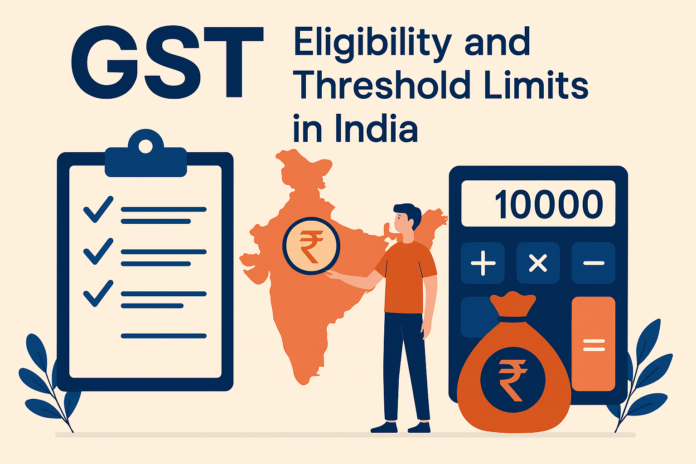Whether you’re a budding entrepreneur, a freelancer, or a small business owner, understanding Goods and Services Tax (GST) is crucial. One of the first questions that comes to mind is—Do I need to register for GST? Let’s explore the answer together.
💼 Who Should Register for GST?
Under the Central Goods and Services Tax Act, 2017, registration becomes mandatory if:
- Your annual turnover exceeds ₹40 lakhs (for supply of goods).
- Your turnover exceeds ₹20 lakhs (for supply of services).
This is applicable in most of the Indian states. However, some states have different criteria, which is covered below.
📍 Special Category States with Lower Limits
Certain northeastern and hilly states enjoy special status. For these Special Category States, the limits are:
- ₹20 lakhs for goods.
- ₹10 lakhs for services.
These states include:
- Arunachal Pradesh
- Manipur
- Meghalaya
- Mizoram
- Nagaland
- Sikkim
- Tripura
- Uttarakhand
These lower thresholds aim to boost business and economic activity in smaller and terrain-challenged regions.
🚚 When GST Registration is Mandatory – No Matter the Turnover
Even if your turnover is below the threshold, you must register for GST in certain situations:
- Interstate supply of goods/services.
- Supply through e-commerce platforms like Amazon or Flipkart.
- If you are liable under reverse charge mechanism.
- You are a casual taxable person or a non-resident taxable person.
📌 Example: If you’re a home-based seller in Assam selling across states via Flipkart, you need GST registration regardless of your turnover.
🧾 Composition Scheme – A Boon for Small Businesses
The Composition Scheme is designed for small taxpayers to make GST compliance simpler:
- Applicable to businesses with annual turnover up to ₹1.5 crore (₹75 lakhs in special category states).
- Fixed tax rate (e.g., 1% for traders, 5% for restaurants).
- Quarterly returns instead of monthly.
However, this comes with restrictions:
- You can’t collect GST from customers.
- You can’t claim Input Tax Credit.
- You cannot deal in interstate supplies or exports.
🔍 Benefits of Registering for GST – Beyond Compliance
- Credibility Boost – Being a registered GST taxpayer enhances your business reputation.
- Access to Bigger Markets – You can easily sell across India and apply for government contracts.
- Seamless Input Credit – You can claim credit on your business expenses.
- Ease in Funding – Lenders often prefer GST-compliant businesses.
✅ Conclusion – Stay Informed, Stay Compliant
GST might sound complex, but it’s here to stay and simplify taxation in the long run. Knowing whether you need to register and choosing the right scheme can save you from penalties and help grow your business the right way.
📞 Pro Tip: Still confused? A GST consultant can guide you through the process and help you make the best decision for your business.



